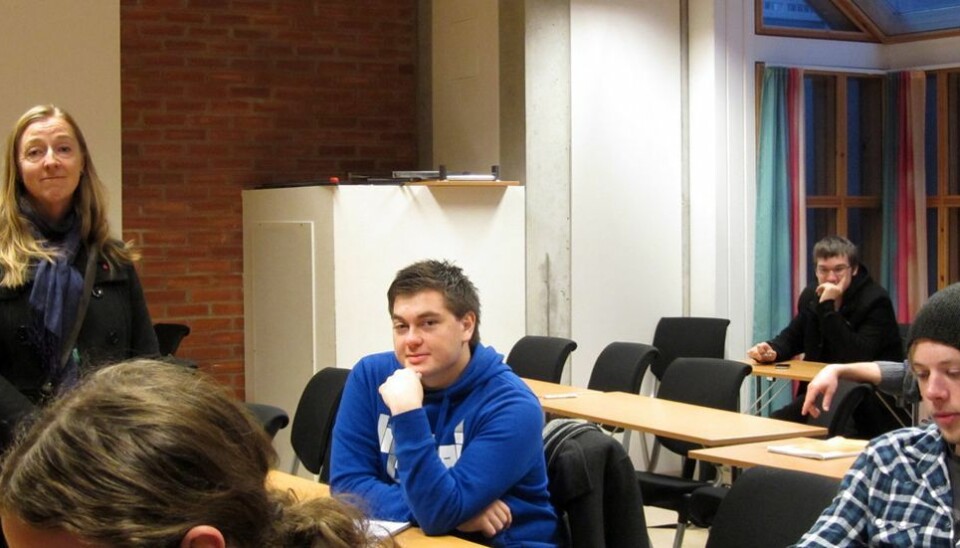In the last few months, the Department of Philosophy and Religious Studies at NTNU has been in the spotlight, following this Spring's hiring of ten men in ten positions. This happened despite the fact that NTNU's action plan for gender equality and diversity states that "All programs of study with a gender imbalance (less than 40 percent of the under-represented gender) must carry out actions to improve gender balance." Recently, there have been discussions, with proposals both from the Dean and the Faculty Board at the Faculty of Humanities, of measures to improve the gender balance at the Department, as discussed in an article in UA.
Funding proposal
We represent a group of philosophers who have, on behalf of the Department, put in a funding proposal to NTNU, to support three actions that we consider as candidate ways to support inclusion, diversity and gender balance in Philosophy, on multiple levels and in the longer run:
- A report on gender balance and diversity in Philosophy in Norway,
- A Trondheim Network for Gender Balance and Diversity in Philosophy
- A review of curricula in Philosophy courses in Norway to establish the extent of the representation of women thinkers, with an extra focus on the Ex.Phil course at NTNU.
Philosophy is one of the most male-dominated fields in the humanities. This imbalance is pronounced also at NTNU. Only 19% of current bachelor students are female. Women make up less than 19% of permanent faculty in philosophy. Academic institutions elsewhere, inside and outside Scandinavia, have taken steps to increase the representation of women in philosophy, such as establishing dedicated networks. We argue that increased efforts in this direction are called for also at NTNU.
Bringing more diversity into the disipline
To the extent that the lack of women in Philosophy reflects outright repression, in the guise of sexual harassment or various forms of illegal discrimination, the case for combating it is uncontested. However, besides warding against such egregious behaviours and mechanisms, there are reasons to actively work towards a more even gender representation in the field. Bringing a wider and more diverse group of people into the discipline, and giving them the conditions to thrive, widens and diversifies the ground from which intellectual work can grow. This point, true of any area of inquiry, arguably has special significance for philosophy. One of its aims is to explore the basic conditions of existence. People of diverse background, including men and women, arguably experience such conditions differently.
A very clear illustration here is offered by recent work developing the philosophy of birth, by such philosophers as Elselijn Kingma and Fiona Woolard, exploring issues in the metaphysics of pregnancy, and the ethics of early motherhood. Experiences such as pregnancy and motherhood are central and necessary to human existence and they are gendered. Slightly less obvious yet still pertinent examples are offered by the recent influential work of Laurie A. Paul on transformative experience (where the experience of motherhood is used as potent example) or the exploration, by Annette Baier, of non-contract-like trust, or basic trust (developed through considering a child-mother relationship). The argument for including women’s voices in the field is only strengthened by looking beyond these questions, given the notable contributions of women philosophers in political philosophy, ethics, philosophy of science, epistemology, metaphysics and so on.
What explains the imbalances?
Efforts to increase the representation of women in philosophy should be informed by an analysis of what structures and barriers can best account for the current imbalance (Fogelberg et al 1999). We focus here on some recent work in social psychology and allied fields, which points to three mechanisms that may be operating here.
First, philosophy is characterised by unusually strong ‘field-specific ability beliefs’, i.e. beliefs that success in the field requires and relies on raw, innate ‘talent’ or ‘brilliance’ (Leslie et al. 2015, Figure 1 p.236). Such beliefs are prevalent in mathematics, and perhaps surprisingly, they are even more pronounced in philosophy. Field-specific ability beliefs are the strongest predictor of how well women (and indeed minorities) are represented in a given field. They are more significantly correlated with gender representation than either of the three following variables: (a) how many hours are worked inside and outside the office; (b) whether there are gender differences in the high end of aptitude scales, and (c) whether the field requires systematizing versus empathising abilities, and combinations of these factors (Leslie et al. 2015).
Two other mechanisms are those of implicit bias and stereotype threat. There is no doubt that philosophy is stereotyped as a male discipline -just google image “philosopher”. Implicit biases against women philosophers can work unconsciously, for both men and women evaluating women -a minority in this field (Jost et. al. 2009). Implicit biases are not conscious and they can manifest at different stages of evaluation, like in the classroom, or in the assessment of CVs, where the presence of a male name or image has a significant effect on CV evaluations (Beebee 2017). If a man’s CV is already assessed as of higher competence than the same, woman’s CV, no matter the field, these biases get amplified when a field is stereotyped as male (white, straight, etc.) (Moss-Racussin et al 2012).
«Self Bias»
Stereotype threat is the ‘self-bias’ that women philosophers can suffer from (Beebee and Saul 2011). When exposed to higher levels of stress, individuals belonging to a stigmatized ‘worse-performing’ or ‘atypical’ group will drastically underperform compared to their own stress-free performance (Beebee and Saul 2011, Steele 2010). Creating inclusive social, work and learning environments is crucial for supporting non-typical people to flourish in philosophy. Yet philosophy prides itself especially on its confrontational style of interaction and debate. The self-esteem and performance of a female student in philosophy may, by this mechanism, be especially negatively affected if she is the only woman present in a lecture room, and she raises a question perceived to be ‘bad’. Being subject to stereotype threat on a daily basis can damage a person’s health and well-being besides their performance over time (Beebee and Saul 2011). Moreover, intersectional identity compounds the issue. As shown for the UK, women are more likely to suffer from specific forms of discrimination such as ageism ( Duncan et al 2004, Calasanti et al 2001) or parenthood bias ( Harris and Estevez 2017) which are particularly penalizing for women struggling for gender balance in academia.
Besides the three mechanisms alluded to, the issue of sexual harassment should also be kept on the agenda. There is evidence that sexual harassment is more prevalent in male-dominated work environments ( Whitley and Page 2015). Sexual harassment has been flagged as a problem in philosophy, both internationally and nationally (Østli-Jakobsen 2016), including among the #metooakademia cases (Østli-Jakobsen 2018).
These various mechanisms, along with others, are likely to work in combination and cycles, tending to perpetuate current gender imbalances. To the extent that they lower the representation of women, they entrench the perception of philosophy as a ‘male’ subject. Lower representation at a given academic level has knock-on effects on the representation at subsequent levels: undergraduate on graduate, graduate on PhD, PhD on postdocs, and postdocs on permanent faculty.
Conclusion – What can be done
A Willingness to Change is listed as one of NTNU’s strategic goals by 2025. Besides targeted measures to support the recruitment of women in Philosophy, we have requested, on behalf of the Department, support for diversified approaches to address these issues.
First, our understanding of the background for the current imbalances should be improved. We therefore call for a study into the lack of gender balance and diversity in academic philosophy in Norway. This study would correspond to, and usefully supplement, similar initiatives elsewhere, such as the inquiry launched by the British Philosophy Association and the Society for Women In Philosophy (SWIP) Committee for Women in Philosophy (Beebee and Saul 2011).
Second, we call for support for the establishment of a Trondheim Network for Gender and Diversity in Philosophy. The network would seek to showcase and discuss the work of women philosophers, and the work of philosophers from other underrepresented groups. Similar networks exist in Bergen (Bergens Nettverk for Kvinner i Filosofi).
Third, we call for an exploration of how women philosophers can be better represented in the philosophy curricula, especially at NTNU. This would serve, among other things, to increase the visibility of the contributions of women to philosophy and counteract the stereotype of philosophy as ‘male’. Given its massive impact in its role as a required subject, the curriculum of Examen philosophicum would be of special importance here.
Følg UA på Facebook, Twitter og Instagram.
Les flere ytringer her.
Authors:
Efstathiou Sophia, Folkestad Ragnhild, D’Oliveira Bouman Rita, Nes Anders, Dyrnes Stabell Espen, Carson Siri, Chaterjee Anamika, Bøe Solveig
References
Beebee, H. (2013). Women and deviance in philosophy. Women in philosophy: What needs to change, 61-80.
Beebee, H. (2017). Women in Philosophy of Science: Where are we, where do we want to be and how do we get there?. Keynote lecture. European Philosophy of Science Association, Exeter. Slides made available by Prof Beebee at https://www.dropbox.com/s/vda273glqu5s16r/EPSA%202017.pptx?dl=0
Beebee, H., & Saul, J. (2011). Women in Philosophy in the UK: A Report by the British Philosophical Association and the Society for Women in Philosophy UK. British Philosophical Association.
Calasanti, T. M., & Slevin, K. F. (2001). Gender, social inequalities, and aging. Rowman Altamira
Duncan, C., Loretto, W. J. G., (2004). Never the right age? Gender and age‐based discrimination in employment, Work, & Organization , 11(1), 95-115.
Fogelberg, P., Hearn, J., Husu, L., & Mankkinnen, T. (1999). Hard Work in the Academy: Research and Interventions on Gender Inequalities in Higher Education: ERIC.
Harris, E. C., & Estevez, M. L. (2017). The role of gender and motherhood ideologies in perpetuating workplace inequality, Harris, E. C., & Estevez, M. L. (2017). Journal of Research in Gender Studies, 7(2).
Jost, J. T., Rudman, L. A., Blair, I. V., Carney, D. R., Dasgupta, N., Glaser, J., & Hardin, C. D. (2009). The existence of implicit bias is beyond reasonable doubt: A refutation of ideological and methodological objections and executive summary of ten studies that no manager should ignore. Research in organizational behavior, 29, 39-69.
Leslie, S. J., Cimpian, A., Meyer, M., & Freeland, E. (2015). Expectations of brilliance underlie gender distributions across academic disciplines. Science, 347(6219), 262-265.
Moss-Racussin, C. et al (2012). Science faculty’s subtle gender biases favor male students. PNAS, vol. 109 no. 4, 16474–16479.
Steele, C. 2010. Whistling Vivaldi and Other Clues to How Stereotypes Affect Us, Norton.
Whitley, L., & Page, T. (2015). Sexism at the centre: Locating the problem of sexual harassment. New Formations, 86(86), 34-53.
Østli Jakobsen, H. (2016) «Bli med meg, jeg har kondom i lommen, mannen din er jo ikke her» En hånd på en rumpe her, en slibrig SMS der. Veien fra følelser til maktmisbruk kan være kort i norske universitetskorridorer. Morgenbladet. 28.10.2016.
Østli Jakobsen, H. (2018) 20 Historier og 661 underskrifter. Tafsing på fagmiddager, trakassering i plenum og faglig baksnakking fra avviste flørtere. #MetooAkademia viser maktmisbruk med bred palett. Morgenbladet. 23.02. 2018.
































































